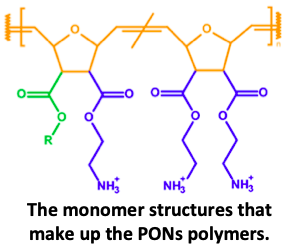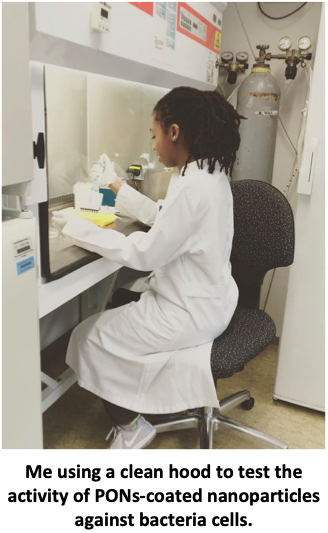September to October 2018
My name is Denise Williams and I am an AGEP scholar studying nanoparticle chemistry at the University of Maryland, Baltimore County (UMBC). In addition to being an AGEP scholar, I am a proud member of the Rosenzweig Lab in UMBC’s Department of Chemistry and Biochemistry and also a Meyerhoff Graduate Fellow. I am from Prince George’s County Maryland, but prior to my studies at UMBC I left the state for my undergraduate studies in both Chemistry and Forensic Science at the University of New Haven in Connecticut. My undergraduate research experiences in analytical chemistry inspired me to pursue graduate studies in a similar area. Hence my current research topic which combines analytical chemistry with inorganic, polymer, and conjugation chemistries. My current research and the international research experience that I will share here have been funded by a National Science Foundation AGEP graduate fellowship supplement award (Grant No. CHE-1506995), the National Science Foundation Center for Chemical Innovation (CCI) program award for the Center for Sustainable Nanotechnology (CSN)(Grant No. CHE-1503408), and a National Institute of Health training supplement (Grant No. NIH-T32-GM066706).
 I had the opportunity to spend 6 weeks as a Visiting Scientist in the lab of Dr. Karen Lienkamp in the Freiburg Centre for Interactive Materials and Bioinspired Technologies (FIT) at the University of Freiberg, and at the Department of Dentistry, Oral and Maxillofacial Surgery in the University Hospital of Freiburg.
I had the opportunity to spend 6 weeks as a Visiting Scientist in the lab of Dr. Karen Lienkamp in the Freiburg Centre for Interactive Materials and Bioinspired Technologies (FIT) at the University of Freiberg, and at the Department of Dentistry, Oral and Maxillofacial Surgery in the University Hospital of Freiburg.
This trip served to satisfy the cross-disciplinary training component of my dissertation research as required by the UMBC Chemistry-Biology Interface (CBI) program.  As a CBI trainee, I am required to: 1) present papers at multiple conferences, 2) take an upper level course outside of my discipline, and 3) participate in cross-disciplinary research training. Fortunately, not only did my research allow me to pursue biological cross-training, it also enabled me to obtain an invaluable international research training experience.
As a CBI trainee, I am required to: 1) present papers at multiple conferences, 2) take an upper level course outside of my discipline, and 3) participate in cross-disciplinary research training. Fortunately, not only did my research allow me to pursue biological cross-training, it also enabled me to obtain an invaluable international research training experience.
The international component was fostered through an ongoing collaboration between the Rosenzweig group at UMBC, my principal investigator’s lab, and the Lienkamp group in Freiburg. The Rosenzweig group is a nanoparticle focused group, where we seek to make new nanoparticles and study their impact on the environment and human health, and their use in biomedical applications. The Lienkamp group is a polymer synthesis group, which aims to make and characterize polymers for several different applications. The collaboration between the two groups seeks to explore the potential use of the Lienkamp group’s patented antimicrobial Synthetic Mimics of Antimicrobial Peptides (aka PONs for their chemical name) when used to coat nanoparticles that the Rosenzweig group provides as antimicrobial nanoparticles. The motivation behind this collaboration arises from: 1) the increasing prevalence of drug-resistant bacteria,  2) the ability of the PONs molecules to kill even these drug-resistant strains of bacteria, and 3) existing literature which demonstrates that coating nanoparticles with antimicrobial drugs and polymers can increase the drug loading and targeting to specific bacteria, followed by increased killing efficiency of the bacteria. To this end, the PONs-coated nanoparticles are used to investigate the interactions between the coated nanoparticles with environmentally-relevant membranes and bacteria, an area of prime interest to the national CSN which supports research projects in the Rosenzweig laboratory.
2) the ability of the PONs molecules to kill even these drug-resistant strains of bacteria, and 3) existing literature which demonstrates that coating nanoparticles with antimicrobial drugs and polymers can increase the drug loading and targeting to specific bacteria, followed by increased killing efficiency of the bacteria. To this end, the PONs-coated nanoparticles are used to investigate the interactions between the coated nanoparticles with environmentally-relevant membranes and bacteria, an area of prime interest to the national CSN which supports research projects in the Rosenzweig laboratory.
The overarching goal of this experience was for me to learn the microbiological techniques used to characterize the activity of the antimicrobial PONs polymers against cells. After learning the techniques, I could then use them to characterize the activity of nanoparticles that are coated with the PONs polymers. The specific objectives to reach this goal were to: 1) successfully coat nanoparticles with PONs molecules, 2) characterize the coating efficiency, and 3) conduct parallel microbiological experiments with the free PONs molecules and PONs-coated nanoparticles.
 The coating and characterization of PONs-coated nanoparticles were started at my home institution, so that they could be shipped in advance and be ready for the microbiological studies once I arrived in Germany. Unfortunately, the particles were held in customs for a week and a half! This meant that instead of working with PONs-coated nanoparticles from the beginning, I alternatively had the chance to thoroughly learn the biological assays with other samples while waiting for their arrival. The specific microbiological studies taught to me by those in the Lienkamp group looked at the how the samples would impact the ability of different bacteria cells and human red blood cells to live after exposure. Specifically, bacteria inhibitory growth assays were completed against Escherichia coli and Staphylococcus aureus cells to look at bacteria growth changes after the cells interacted with polymers and nanoparticles. The bursting of human red blood cells in the same conditions was investigated using a hemolysis assay.
The coating and characterization of PONs-coated nanoparticles were started at my home institution, so that they could be shipped in advance and be ready for the microbiological studies once I arrived in Germany. Unfortunately, the particles were held in customs for a week and a half! This meant that instead of working with PONs-coated nanoparticles from the beginning, I alternatively had the chance to thoroughly learn the biological assays with other samples while waiting for their arrival. The specific microbiological studies taught to me by those in the Lienkamp group looked at the how the samples would impact the ability of different bacteria cells and human red blood cells to live after exposure. Specifically, bacteria inhibitory growth assays were completed against Escherichia coli and Staphylococcus aureus cells to look at bacteria growth changes after the cells interacted with polymers and nanoparticles. The bursting of human red blood cells in the same conditions was investigated using a hemolysis assay.
While only some of the objectives were fully completed in the six weeks, every objective was started with general success. Fortuitously, the preliminary results analyzed from replicates of these microbiological assays with free PONs, nanoparticles, and PONs-coated nanoparticles indicate the potential for this cross-training experience to continue into a publication-producing collaboration with the Lienkamp group.
I am appreciative of the opportunity to complete this international cross-training experience. It afforded me the opportunity to be immersed in a different scientific culture and discipline, interact with people from Germany and Switzerland at their home, and even take in a new country’s scenery and history in my free time.
I’d like to acknowledge Dr. Lienkamp, Vera Bleicher, Dr. Sibylle Rau and others of the FIT and the University Hospital for extending their time, resources, expertise and friendliness. Further, I’d also like to thank Dr. Rosenzweig for allowing me time away from the UMBC lab to receive this training, and Dr. Seley-Radtke for facilitating the CBI program and encouraging me and other trainees to pursue cross-disciplinary training and expand our expertise and horizons. Provided the opportunity, I would feel more confident returning to Germany or any other international lab to receive training and international perspectives.

Posted: December 13, 2018, 5:51 PM